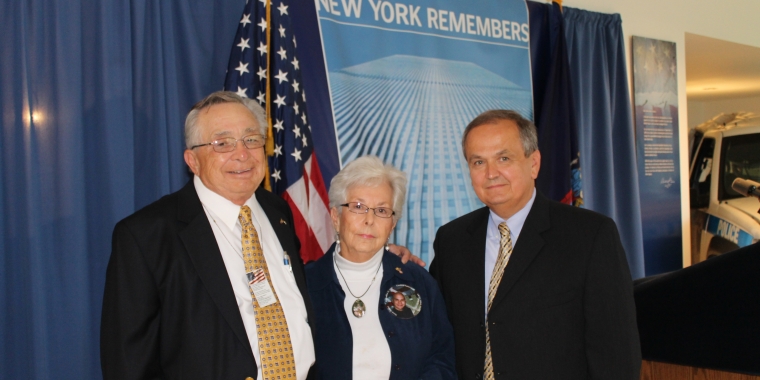Senate Republicans Call on Governor To Remove Utility Tax Surcharge Extension From Executive Budget
George D. Maziarz
February 5, 2013
-
ISSUE:
- Energy
-
COMMITTEE:
- Energy and Telecommunications

Senate Republican Leader Dean Skelos and members of the Senate Republican Conference, including Senator Maziarz were joined today by leaders of statewide business organizations to urge Governor Cuomo to remove the proposed extension of the utility tax surcharge from his Executive Budget. The 18-a surcharge, which has increased utility bills for every ratepayer in the state, is scheduled to expire on March 31, 2014. The Governor’s proposed five-year extension would cost businesses and consumers a total of almost $3 billion.
Senate Republicans were joined at a Capitol news conference by representatives of the Business Council of New York State, the National Federation of Independent Businesses, the Manufacturers Association of Central New York, the New York Farm Bureau and AARP. Other businesses groups, including Unshackle Upstate and the Long Island Association, also support the Senate’s call to end the utility tax surcharge as scheduled.
“Allowing this tax surcharge to expire will make New York more economically competitive, reduce costs on businesses, help expand our economy, and create new private sector jobs,” Senator Skelos said. “This is a key element of our job creation agenda for this year. New Yorkers already pay some of the highest utility rates in the country and this is an opportunity to give them a break and bring those bills down.”
“Every day, ratepayers from across our state call my office and ask ‘Why is my utility bill so high?’” said Senator George Maziarz, Chairman of the Senate Committee on Energy and Telecommunications. “The answer to that question is the numerous taxes and fees imposed on businesses and consumers alike, the worst of which is the 18-a assessment. This tax hits every single business and residence in our state, and increases the cost of energy by $509 million a year. I, along with my colleagues in the Republican conference voted against this tax when it was imposed and we simply will not stand by silently as the can is kicked down the road for five more years. When this tax was adopted by Senate Democrats we were promised, and in turn we promised our constituents, that it would be temporary. It’s long past time that we kept that promise.”
The proposed extension would cost energy ratepayers $509 million for this year and the following four years, as well as $255 million in state fiscal year (SFY) 2018-19. The total impact of the extension would be $2.8 billion, with most of the burden falling on small and large businesses, particularly manufacturers that use large amounts of energy. Senate Republicans said the Governor should use the 21-day amendment process to remove the proposed extension from his budget plan. The actual impact on the SFY 2013-14 budget of ending the surcharge would be $236 million, a small amount in the context of a $136.5 billion budget.
According to figures from National Grid, the impact of the energy tax extension on a typical large business is estimated at $30,000 per year. The added cost on a typical small business would be about $540 per year and average household utility bills would increase by $55 per year.
The energy tax surcharge was imposed in 2009 by Senate Democrats and Governor Paterson on electric, gas, steam and non-municipal water services. Every Senate Republican voted against it. The surcharge was intended to be a temporary measure that would expire on March 31, 2014. However, the 2013-14 Executive Budget proposes to extend the tax surcharge for another five years.
Heather Briccetti, president and CEO of The Business Council of New York State, Inc. said:
“New York's electric rates are heavily burdened by hidden taxes. A report by Public Policy Institute finds more than one-quarter of electric bills in New York are from state and local taxes. Extending the so-called ‘Section 18-a’ fee will cost all energy consumers in the state at total of $2.8 billion. We urge the governor to reconsider and use the 21-day amendments process to amend or remove Part N. In 2009, when this temporary fee was imposed, there was an explicit promise to the people of the state that this tax would not be permanent.”
Mike Durant, NFIB/NY State Director said: “Energy costs consistently rank as a top concern for small business, and assessments such as 18-a have been a significant cost driver in energy. Repealing this onerous tax has been a priority for NFIB and we are pleased to join with the Senate Republican Conference in calling for this tax extension to be removed from the Executive Budget proposal."
Brian Sampson, Executive Director of Unshackle Upstate, said: “New York businesses and homeowners continue to pay some of the nation’s highest energy costs, and state-imposed taxes such as the 18-a tax are a big part of those high energy costs. We have called for the repeal of this regressive, onerous and anti-economic growth energy tax since it was first enacted, and we strongly oppose any extension beyond its planned 2014 expiration.”
Kevin Law, President & CEO of the Long Island Association, said: “The 18-a energy tax adds to the cost of doing business on Long Island and makes our region and entire state less competitive, and thus its proposed extension in the budget should be eliminated.”
Karyn Burns, Vice President for Communications & Government Relations of MACNY, The Manufacturers Association of Central New York, stated, "As we began our path together in achieving fiscal stability here in New York State three years ago, Governor Cuomo remained committed to not raising taxes on businesses and residents, and in turn the State's manufacturing and business community worked to keep business going, their doors open, products manufactured and job retained and added. Like anything worth doing, it was tough, but it was done. An extension of the 18-a tax would be a huge step back for these hard working businesses. Those very same companies had paid the temporary tax with the belief it would sunset, and planned their business and expansion plans according to this promise from Albany. To continue this tax will most certainly compromise the business community's ability to do everything they need to on this continued path towards economic recovery. I urge Governor Cuomo to remove this proposal from his budget proposal, and thank the Senate Republicans on their commitment to do so."
Julie Suarez, New York Farm Bureau Public Policy Director, said: “At a time when the prices of feed and fuel are sky high for our members, it is imperative for the state to allow the Article 18-a assessment step down to go forward to help contain rising production costs. Profit margins are thin at best for many of New York’s family farms, and keeping the 2% “tax” in place is not the business friendly approach that will help New York’s farms be more competitive. We appreciate the efforts of Senator Skelos and his conference to push for the rollback to continue as scheduled.”
Beth Finkel, State Director for AARP New York, said: “AARP commends the Senate for their leadership in working to make utility bills more affordable for all New Yorkers. This is a crucial kitchen table issue, as state residents pay some of the highest utility costs in the nation, a status that takes an unduly harsh toll on the elderly and those on fixed incomes. This move, coupled with AARP's push to help consumers have a stronger voice during rate hikes, is surely needed to help New Yorkers better afford the basic necessity of their utilities."
Section 18-a of the Public Service Law authorizes an assessment on utility bills to fund the operations of energy-related agencies and authorities such as the Department of Public Service and the New York State Energy Research and Development Authority. In 2009, Governor Paterson and Senate Democrats permanently increased the assessment from one-third of a percent to one percent, and added an additional one-percent surcharge, making for a total five-fold increase on all ratepayers. The additional revenue raised from the increase is deposited in the state’s general fund. Under the 2009 law, the increase is scheduled to be reduced to one percent in SFY 2014-15.
Share this Article or Press Release
Newsroom
Go to NewsroomSenator Maziarz honored by Mount St. Mary's Hospital
September 20, 2011
"New York Remembers" exhibit highlights 9/11 anniversary
September 8, 2011

Statement from Senator George Maziarz
September 8, 2011
